

 |
 |
|
 |
|
| About Us |
|
Read Past Issues | Resources | Composer Links |
Rautavaara, the leading Finnish composer of his generation. Says he has long been fascinated by the charismatic mysticism of the illiterate peasant turned court confidant, whose colorful life ended in poison, bullets and the ultimate destruction of the Imperial family. The composer was finally spurred on to create the opera by the recent publication of Edvard Radzinsky's book that includes the transcripts of police interrogations with Rasputin which "almost begged to be set as a libretto". "The key word to the libretto is ambivalence; Rasputin was a mysterious peasant, a muzhik, who was deeply religious, a fervent Christian and ascetic, almost a prophet – but on the other hand the very incarnation of corruption and debauchery, a drunk, and if rumors are to be believed also the Tsarina's lover and counsellor whose advice ruined the entire country, Rautavaara writes. “However, it does not seem appropriate to create merely a realistic stage play, a re-enactment of history or a recreation of an episode. There must also be a presence of profound Russian mysticism, the 'wind from Siberia' which can be sensed in the existentialism of Dostoevsky or the dolorous pessimism of Tchaikovsky." Rautavaara was born in Helsinki in 1928 and studied with Merikanto at the Helsinki Academy (1948-52), with Persichetti at the Juilliard School in New York (1955-56), and with Roger Sessions and Aaron Copland at Tanglewood (1955). He first came to international attention in 1955 when the neo-classical A Requiem in Our Time for brass and percussion won the Thor Johnson Composer’s Competition in Cincinnati. He studied serialism and soon integrated twelve note techniques, without displacing his essential Romanticism. For instance, Symphony No.3 (1961) may be the first totally serial Finnish work, yet it is also a tribute to the symphonies of Bruckner, complete with Wagner tubas. In the late
1960s Rautavaara distanced himself from serialism and his mystical character
came more to the fore in music of rich color and sweeping melodic profile,
at once accessible and evocative. His operas have often explored issues
of creativity and madness, such as Vincent (1986-87), Aleksis Kivi (1995-96)
and Rasputin (2001-03), and his symphonies and concerti have increasingly
been commissioned by orchestras outside his native Finland, including most
recently Symphony No.8 ‘The Journey’ (1999) for the Philadelphia Orchestra,
a Harp Concerto (1999-2000) for the Minnesota Orchestra and a Clarinet
Concerto (2001-02) for Richard Stoltzman and the National Symphony in Washington.
Among his immensely popular works are Cantus arcticus (1972) Concerto for
birds and orchestra; Angels and Visitations (1978) for orchestra; andSymphony
No.7 (Angel of Light) (1995) for orchestra.
|
|
An Interview with Tobias Picker Handmaid Tale's Debuts in English Rautavaara Joins B&G Who's Afraid of Julia Wolfe Derek Bermel's Soul Garden The Pianist: The Extraordinary True Story of Wladyslaw Szpilman John Adams' Atomic Opera A Bridge Not Far Enough Turnage Signs With B&H Sophie's Wrong Choice Copland's Mexico On Being Arvo Rzewski Plays Rzewski Praising Lee Hyla David Lang's Passing Measures Three Tales at BAM Naxos at 15 On the Transmigration of Souls Dead Man Walking David Krakauer's The Year After Steve Reich/Alan Pierson
|
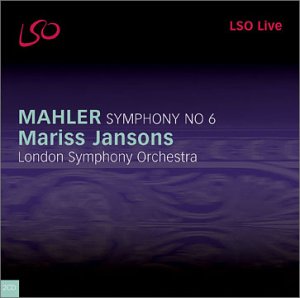
Symphony No. 6 Composer: Gustav Mahler Performer: London Symphony Orchestra; Mariss Jansons Label: LSO Live It is rare that you find a recording that you need listen to for only a minute to know a masterpiece is unfolding before your very ears. This stunning live performance of Mahler's "Tragic" symphony is one of the rare ones, From the first rhythmic thumps of the long and stately funeral march to the final faded chords, Mariss Jansons draws a passionate and committed performance from the LSO. Certain to be among the best of the year noninees. |

Wheel of Emptiness Composer: Jonathan Harvey Performers: Actus Cyprès CYP5604 English composer Jonathan Harvey is one of those modernists whose work is more frequently talked about then played. This rare recording contains five representative works ranging from the lyrical to the raw, built on instrumentations ranging from electroacoustical to the traditional. An excellent introduction to an unjustly neglected maverick. |
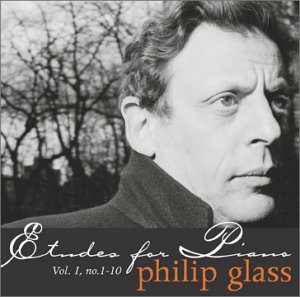
Piano Etudes 1 Composer: Philip Glass Performer: Philip Glass Orange Mountain Glass says he wrote these "studies" as fodder for his own concert performances and as a way of challenging himself as a pianist. But, they are much more important than that. They provide a real insight into how Glass composes and, although billed as sketches, sometimes are more rewarding to the ear and intellect than many of Glass's larger-scale works. Essential recording for the Glassologist.
|
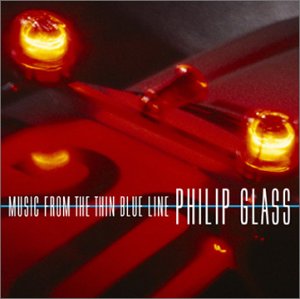
Music from the Thin Blue Line Composer: Philip Glass Orange Mountain Glass's
hypnotic score for Errol Morris’ extraordinary 1988 documentary film
entitled "The Thin Blue Line".
|
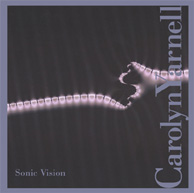
Sonic Vision Composer: Carolyn Yarnell Tzadik Inspired by the beauty and power of nature, the music of Carolyn Yarnell straddles the borders of minimalism, romanticism and Baroque. Sonic Vision, the first CD devoted entirely to her music, contains the powerful electronic composition Love God, a beautiful solo piece for Baroque flute, a minimalist suite for chamber ensemble and a powerful extended work for computer piano. Lyrical and mystical music that evokes volcanoes, birds and the Rocky Mountains. |
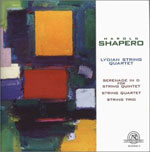
Chamber Music Composer; Harold Shapero Performers: Lydian String Quartet New World Records - Shapero’s (b. 1920) vastly underrated portfolio is one of the great undiscovered treasure troves of American neoclassicism. The String Trio, the String Quartet, the Serenade in D offer a broad-based introduction to Shapero’s compositional thought processes. Beautiful, committed playing by the Lydian String Quartet. |

Drumming Composer: Steve Reich Performer: Ictus, Synergy Vocals Cypres Reich's 1971 masterpiece gets a spirited workout by the Belgian new music group Ictus. Drumming is constructed around one single basic rhythmic-melodic pattern, for an imposing ensemble of percussion (bongos, marimbas, glockenspiel) joined by some female voices, a piccolo flute or a whistling part. The breathtaking feeling of simplicity/complexity in this work is transmitted with an amazing skill by the Belgians. |
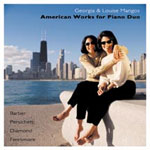
American Works for Piano Duo Composer(s): Barber, Persichetti, Diamond, Fennimore Performer (s): Georgia & Louis Mangos Cedille Records Barber's homage to the Plaza Hotel's Palm Court, Souvenirs, Op. 28, has never sounded better or more nostalgic and Joseph Fennimore's Crystal Stairs also invokes the quintessential American city. The real surprise here are the two pieces by Vincent Persichetti, which invoke a more dynamic and rough and tumble form of Americanism. The Mango sisters display formidable technique and taste.
|
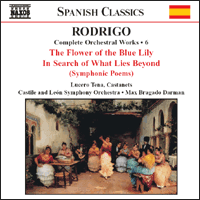
Orchestral Works 6 Composer: Joaquin Rodrigo Conductor: Max Bragado-Darman Performer: Lucero Tena Naxos For a guy who is basically famous for a single work, Rodrigo sure wrote a lot of sparkling, sunny, highly-listenable music. Not sure how many more of these Naxos has in the works but I'm not tired yet. |
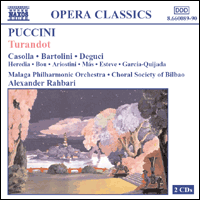
Turandot Composer: Giacomo Puccini Conductor: Alexander Rahbari Performer: Masako Deguci, Jose A. Garcia-Quijada, et al. Naxos Like a local wine consumed with good friends and good food not far from the vineyard, regional opera productions of famous operas often have a charm, passion, and character that befies their modest ambitions. This thoroughly charming rendering of Puccini's most hummable score is one of those unexpected delights. |
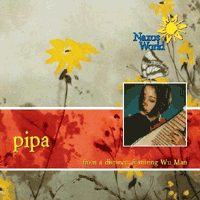
Pipa From a Distance Performer: Wu Man, Stewart Dempster, Abel Domingues Naxos In addition to being a rightous goodlooking babe, Wu Man is probably the best pipa player alive and here she takes on some thoroughly modern pieces with results that range from the soothing to the downright eerie. There are echos of Yo Yo Ma's Silk Road Project (for which Wu Man served as main pipa person) as well as hints of new traditions yet to come. |
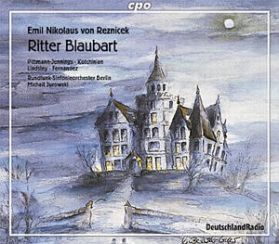
Ritter Blaubart Composer: Emil Nikolaus von Reznicek Conductor: Michail Jurowski Performer: Arutiun Kotchinian, Robert Worle, et al. Cpo Records Emil Nikolaus von Reznicek (1860-1945) is remembered for a single work, the overture to the opera Donna Diana but CPO hopes to change that with the release of his Ritter Blaubart (Knight Bluebeard), a fairy-tale opera. Gretry, Offenbach and Bartok were also drawn to the story of Bluebeard, the mythical figure who kills his faithless wife and then murders the other women he marries. Reznicek's version boasts music filled with atmosphere and keen drama. Conductor Michail Jurowski leads the Berlin Radio Orchestra and a cast of fine singers in a powerful performance. |

The Shock of the Old Composer: Common Sense Composers' Collective Santa Fe New Music - #513 Consider the possibility that ancient instruments like the harpsichord, Baroque flute and so on can be used to play contemporary music as well and you have the idea behind this very fresh and appealing collaboration between the Common Sense Composers' Collective--an eight-member cooperative based in New York and San Francisco--and American Baroque, an early-music consort that makes its home in the Bay Area. Remarkable stuff that should make converts on both ends of the musical spectrum. |
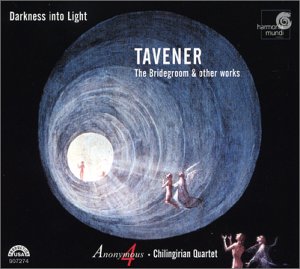
Darkness into Light Composer: Composer: John Tavener Performer: Anonymous 4 Harmonia Mundi Franc Four pieces by contemporary mystic composer John Tavener framed by medieval hymns illustrate the passage from darkness to light in this hypnotic collaboration between Anonymous 4 and the Chilingirian Quartet. The most substantial piece is the world premiere of Tavener's "The Bridgegroom," which is nearly 18 minutes long and spellbinding from start to finish.
|
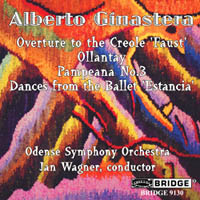
Overture to the Creole 'Faust' Ollantay, Pampeana No. 3 Dances from the Ballet, 'Estancia' Composer: Alberto Ginastera Performers: Odense Symphony Orchestra, Jan Wagner, conductor BRIDGE 9130 The nice folks at Bridge Records are obviously thinking Latin America these days with their recent fabulous Villa-Lobos release and now this superb collection of music from the great Argentine composer Alberto Ginaestera--played, as was the Villa-Lobos, by the Odense Symphony Orchestra under Jan Wagner. This is bold and flavorful music served fresh and hot--the way you like it. |
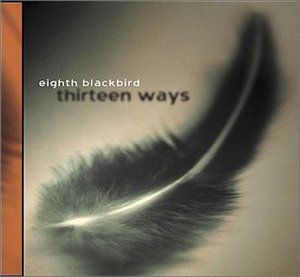
Thirteen Ways Composers: Tower, Perle, etc Performer(s): Eighth Blackbird You got to love a group that takes its name from one of Wallace Stevens' best poems but you'd love them if their name was Band X. This six-member ensemble mixes flutes, clarinets, violin and viola, cello, percussion and piano to create a big sound for chamber pieces. The composers here--Joan Tower, George Perle, David Schobar, and Thomas Albert--are all given polished and enthusiastic readings. Absolutely first-rate and highly recommended. |
 |
Search WWWSearch www.sequenza21.com |
